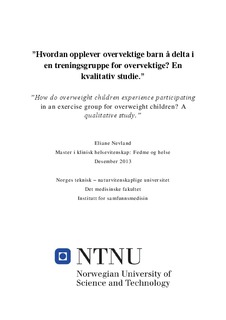Hvordan opplever overvektige barn å delta i en treningsgruppe for overvektige? - En kvalitativ studie
Master thesis
Permanent lenke
http://hdl.handle.net/11250/281318Utgivelsesdato
2013Metadata
Vis full innførselSamlinger
Sammendrag
Background: During the last decade overweight has become one of the most common health
problems in the world. Several strategies have been tried implemented to counter this
development. Exercise groups for overweight children are one example of a potential counter
strategy. Children`s own experiences of participating in these exercise groups have however
been poorly documented.
Purpose: The objective of this study was to document how children, who participate in
exercise groups for overweight children, evaluate their experience.
Material & methods: Data was collected by participating in an exercise group for
overweight children between the ages of 8 to15. Participant observations as well as in-depth
interviews of 6 children allowed the researcher to gather important information from the
participants. The data was later processed and analyzed in accordance with systematic text
condensation and thematic analysis.
Results: This study showed that children had an overall pleasant experience when
participating in the exercise group. The children indicated general well-being, happiness from
making new friends, feelings of accomplishment as well as self-determination. It became
evident that the goal of getting in better shape motivated the children to continue exercising
on their own free time. It was quite clear that activities which focused on endurance and
strength alone did not result in as much engagement as “play-centered” activities. The
children were also appreciative when given the opportunity to influence the exercise with
activities of their choosing.
Conclusion: The participants in the exercise group stated that their experience was positive.
The exercise group was an enjoyable arena for workouts, and it provided pleasant side effects
such as making new friends.
Relevance: The objective of this research was to gain insights in children’s experiences when
taking part in an exercise group for overweight children. Children’s perspectives are known to
be poorly documented, it is however important to ask those participating in the groups to
reveal how effective they really are. The perspectives of the children can also help when
trying to make this type of exercise groups more attractive for other children.
There is a need for larger studies within this area to supplement and possibly confirm the
results found in this specific study. It is also of major importance that future studies focus on
the experience of the children, rather than the adults alone.
